Introduction
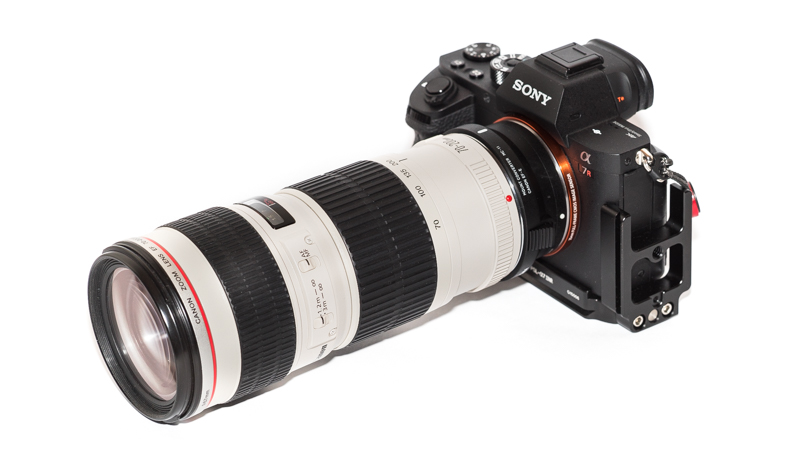
For a long time I have been searching for a lightweight telezoom with very good optical properties, well defined sunstars and a justifiable price. By chance I came along some nice photos my friend Chris from Cologne took with his Canon EF 70-200mm 4.0 L USM and after talking to him he even offered to lend me the lens for a review. So find out if my search has finally come to an end!
Sample Images

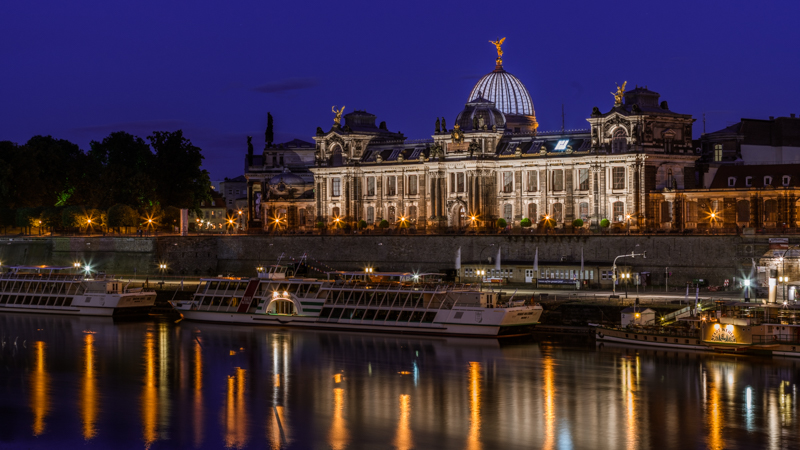
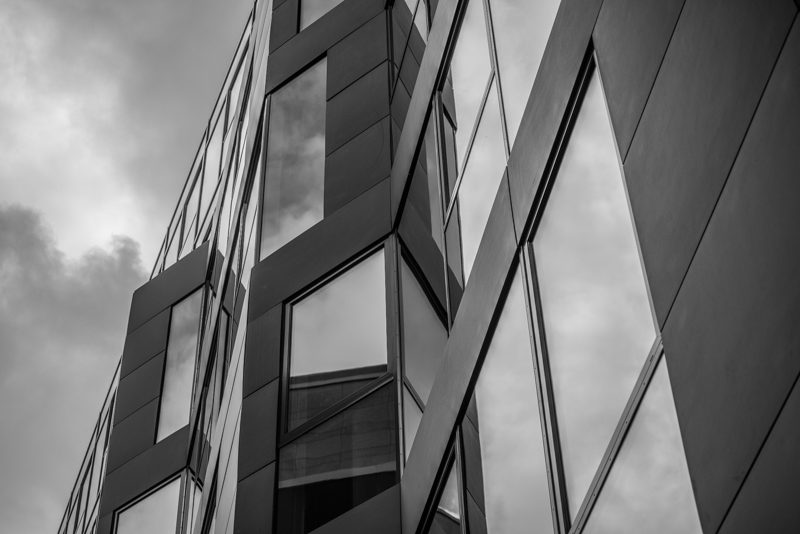
Specifications / Version History
In case you are a Canon shooter you have quite a lot of options when it comes to native 70-200mm lenses:
- Canon EF 70-200mm 4.0 L USM (reviewed here)
- Canon EF 70-200mm 4.0 L USM IS
- Canon EF 70-200mm 2.8 L USM
- Canon EF 70-200mm 2.8 L USM IS II
not taking into account the third party and some older (80-200mm) lenses you could also use. The 2.8 models are simply to heavy for my needs and as the A7rII has IBIS I was most interested in the 70-200mm 4.0 L USM without IS which is also the lightest and cheapest of the bunch and has the following specifications:
-
- Diameter: 76 mm
- Field of view: 34° to 12° (diagonally)
- Length: 172 mm
- Weight: 705g (without tripod collar)
- Filter Diameter: 67 mm
- Number of Aperture Blades: 8 (rounded)
- Elements/Groups: 16/13
- Close Focusing Distance: 1.2 m
- Maximum Magnification: 1:4.8
- Mount: Canon-EF
You may also have a look at Canon’s official page.
You can get used ones for 450-500$ on ebay.com and for 400-450€ on ebay.de
or you can still buy it new for $599/599€ on amazon.com/amazon.de/B&H (affiliate links)
Thanks
to my friend Chris who provided the lens in combination with his Commlite AF adapter for roughly two weeks.
Handling / Build Quality
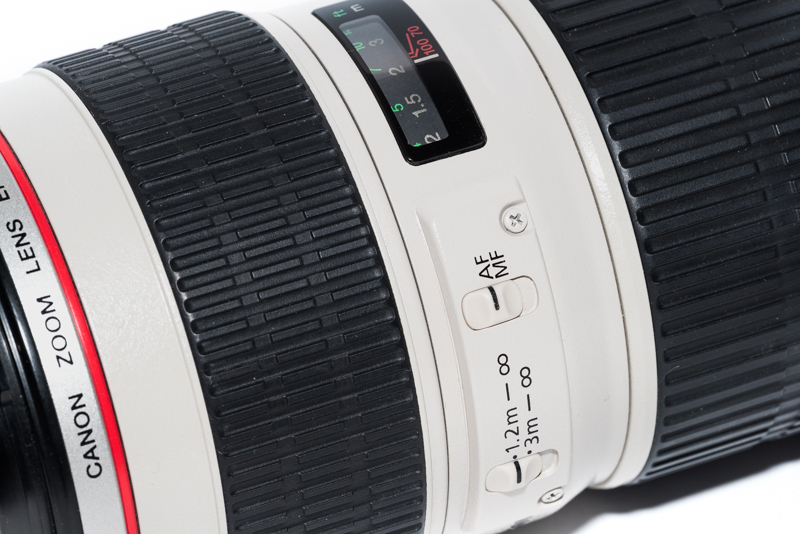
The lens is part of Canon’s L grade professional lenses and also one of the cheapest L lenses you can buy. Most of the casing is made of metal, despite the plastic filter thread. It takes about 60° turning the zoom ring from 70 to 200 mm and about 120° for the focusing ring from infinity to 1.2 m. The focusing ring is not fly-by-wire and there is no slack when changing the direction of rotation (very) often seen on newer Nikon lenses.
Nothing moves externally and both rings are easily operated. There is also no zoom creep, no matter in which direction (up or down) you point the lens. In addition there is an AF <-> MF button and a focus limiter.
The lens hood is very big, very plasticy and feels quite cheap compared to the rest of the lens. A tripod collar is not part of the package but available as an additional accessoire.
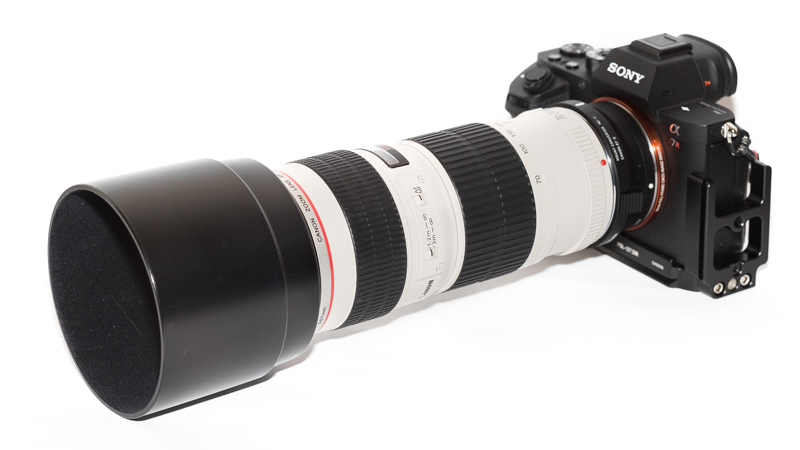
There is actually rarely anything bad I can say about the handling of the lens, only the position of the quite narrow focusing ring up front was not up to my taste, but your mileage may vary here.
Autofocus
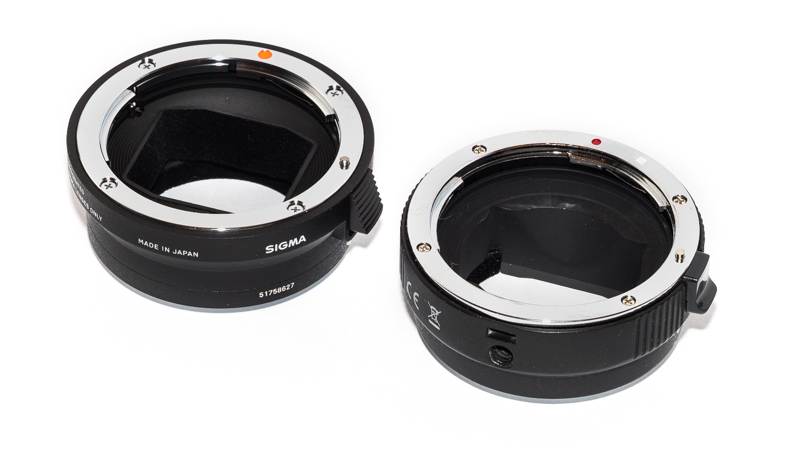
To make a long story short: I ended up testing 3 adapters here: Commlite* (65$), Viltrox II
* (100$) and Sigma MC-11
* (300$). With the Commlite my friend Chris who send me the lens got great results on the A7II with Phase-detect AF. With my A7rII the AF was quite ok below 135mm but above that completely unusable. Same story with the Viltrox II, which also had quite a wobbly connection to the Canon lens.
I did not want to put nearly 500$ for the Metabones IV Smart Adapter* on the table and decided to test the quite new Sigma adapter as I got word it works quite good with nearly all Canon lenses. So far I can say this is in fact very true (for the 70-200mm 4.0L and the 135mm 2.0L).
In good lighting conditions it actually is quite snappy, I am even tempted to say fast. There is rarely any hunting even when going from infinity to the minimum focus distance.
In the dark things don’t look as great: there is much more hunting, I got the impression the camera goes a little bit more towards contrast detect AF and it also missed the target on first the attempt a few times.
I am not so sure this is the adapter’s fault, as f/4.0 isn’t really that fast. I intend to use the adapter with some other (faster) lenses in the near future to clarify things here.
As of today I would still have no objections recommending the Sigma MC-11 adapter*, as it offers a (working) update function, works great with the new Sigma lenses but also very good with at least this Canon lens and is not as expensive as the metabones.
(*affiliate links)
Vignetting
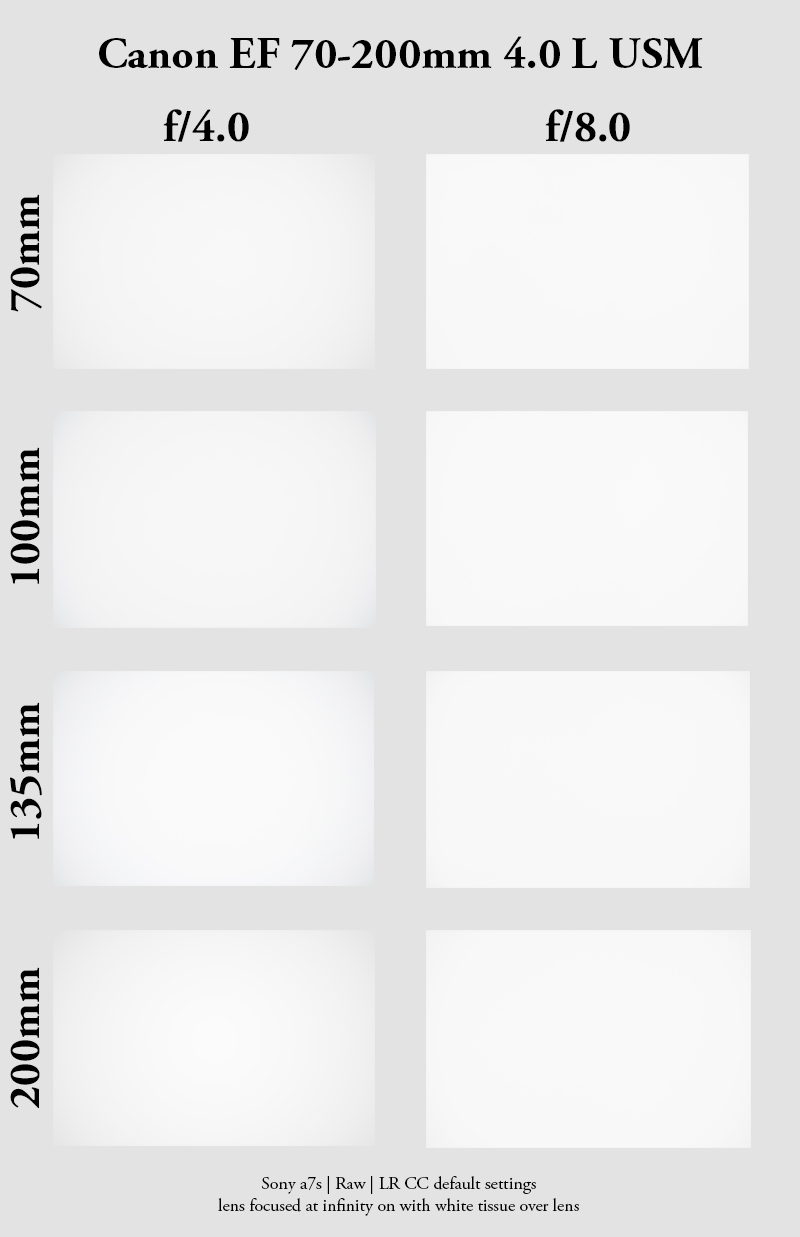
Even wide open there is hardly any vignetting visible. Stop down to f/8.0 and you can’t see any at all. There is also a Lightroom profile for correcting this.
Sharpness
infinity
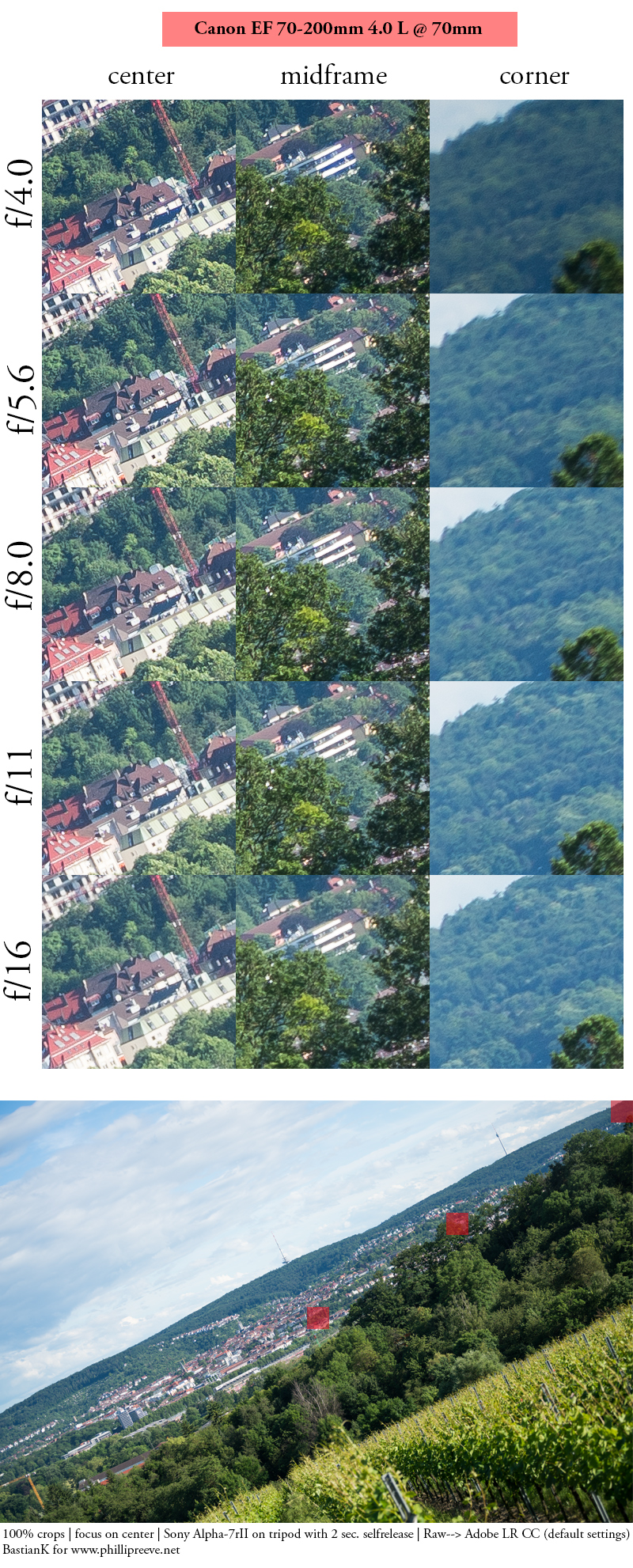
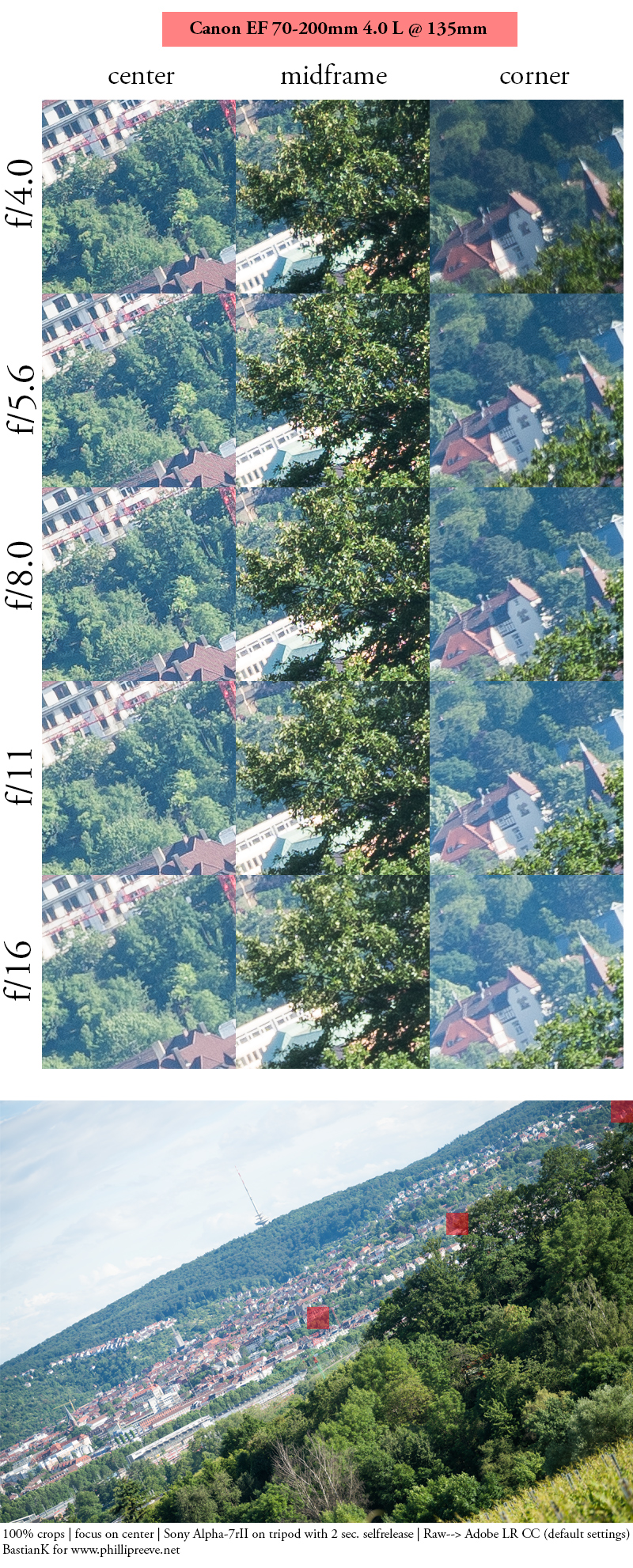
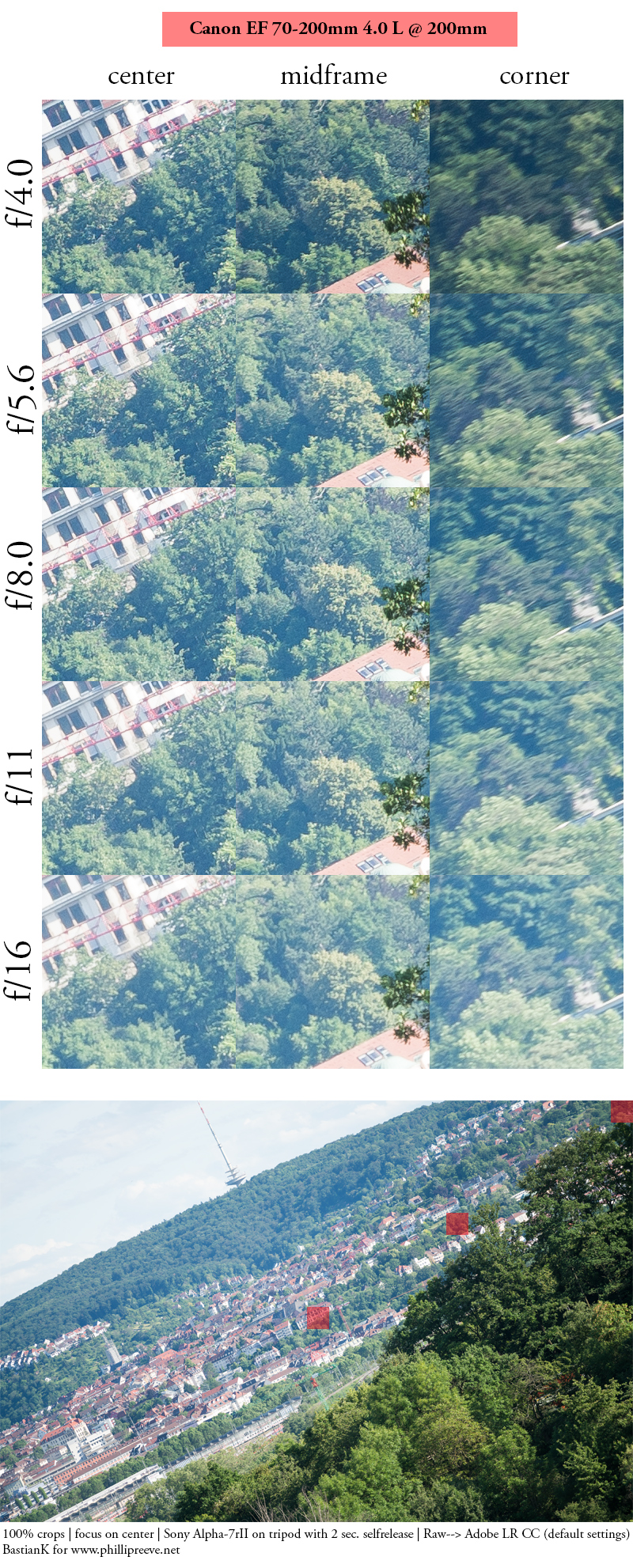
Center and midframe are pretty much excellent at every focal length and at every aperture setting (at f/16 you clearly see the effects of diffraction). The corners are best at 135mm where very good sharpness is reached at f/8. At 70mm and 200mm the corners are unfortunately best at f/16.
This is the first test with the 42mp A7rII on this site, keep that in mind when making comparisons to other lenses. I would have wished for a tad better performance at 70mm, but I consider the results good to very good nevertheless.
close focus
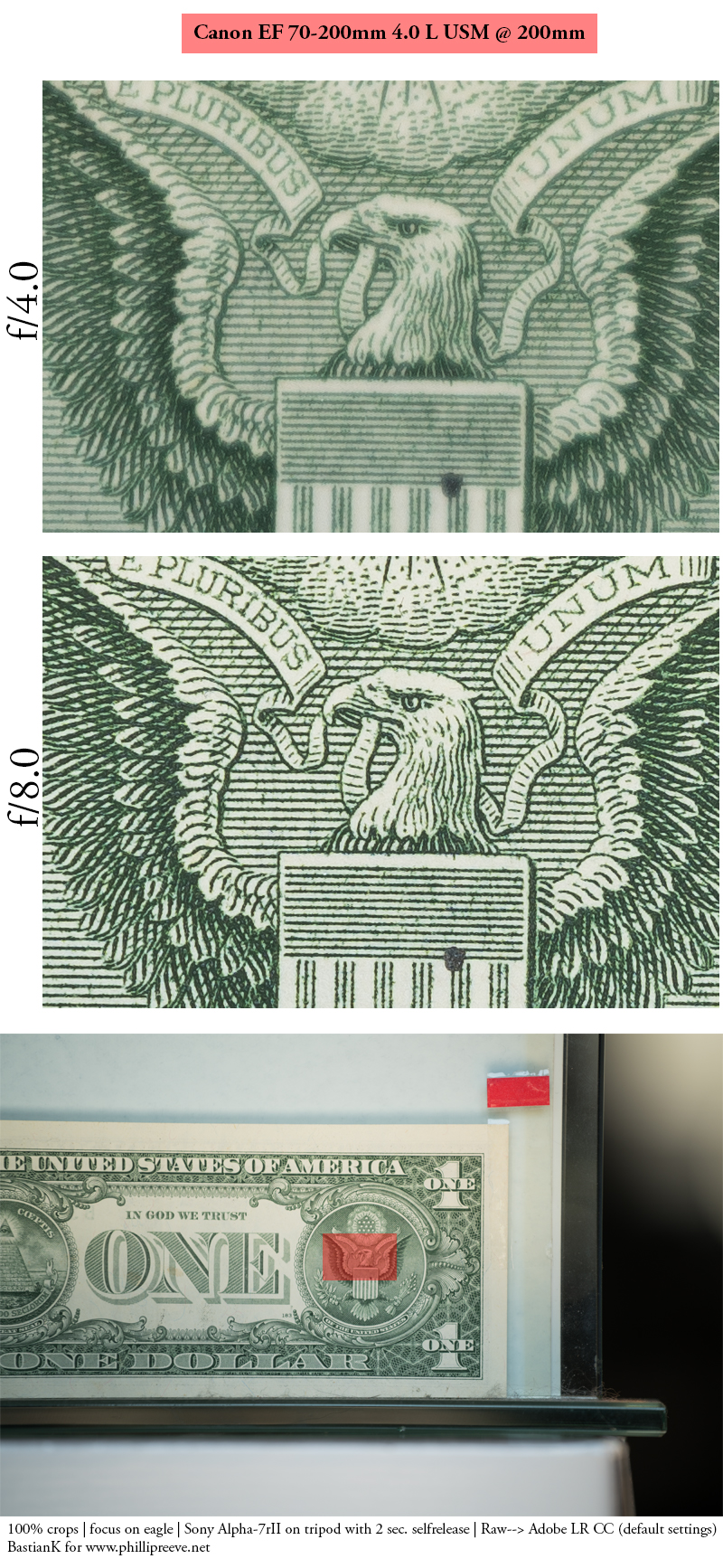
With the 42mp A7rII you see some softness at the minimum focus distance in the 100% crop (shot at 200mm). Stopping down to f/8.0 and sharpness and contrast become excellent.
Flare resistance
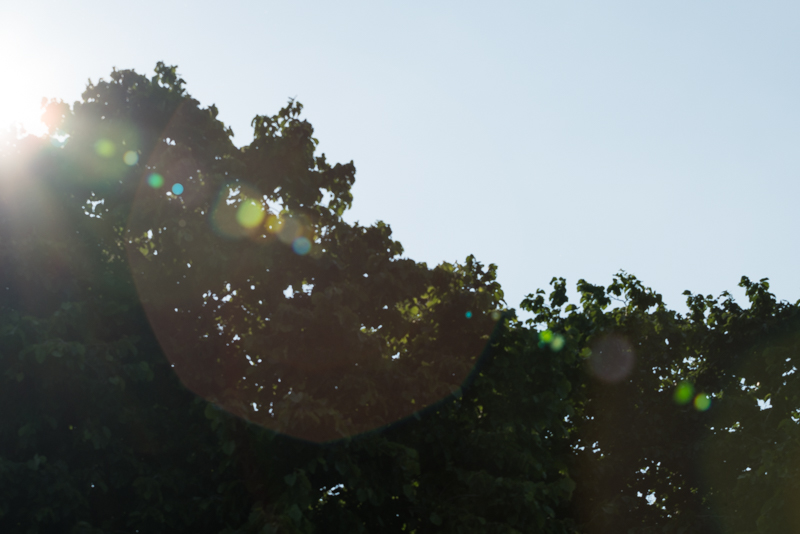
This is definetly the weak spot of the lens. With the sun inside the frame there is a tremendous amount of ghosts.
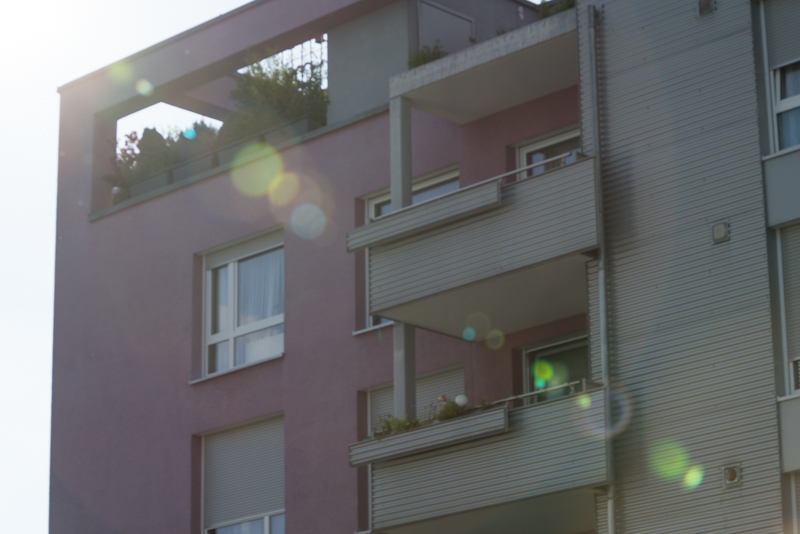
Distortion
Very minor barrel distortion at 70mm, a little pincushion distortion at 135mm and a little more pincushion distortion at 200mm. Easy to correct in Lightroom or Photoshop.
Bokeh
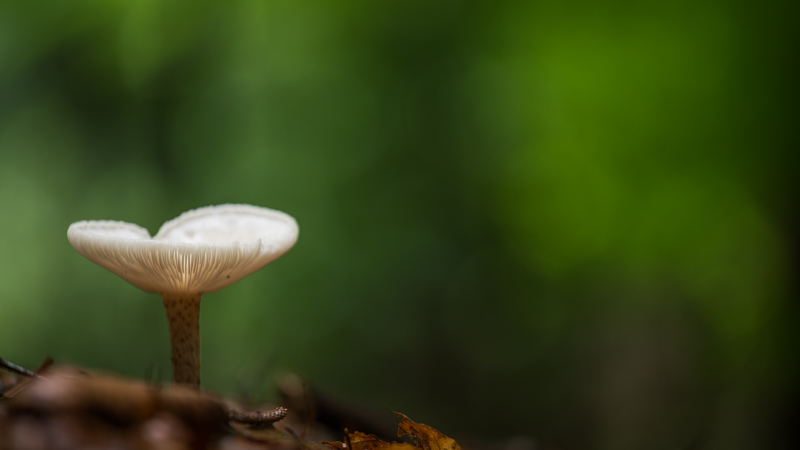
Take a look at some of the sample images. The bokeh is not bad, but with a maximum aperture of f/4.0 there are of course faster lenses which will throw the background more out of focus.
Sunstars
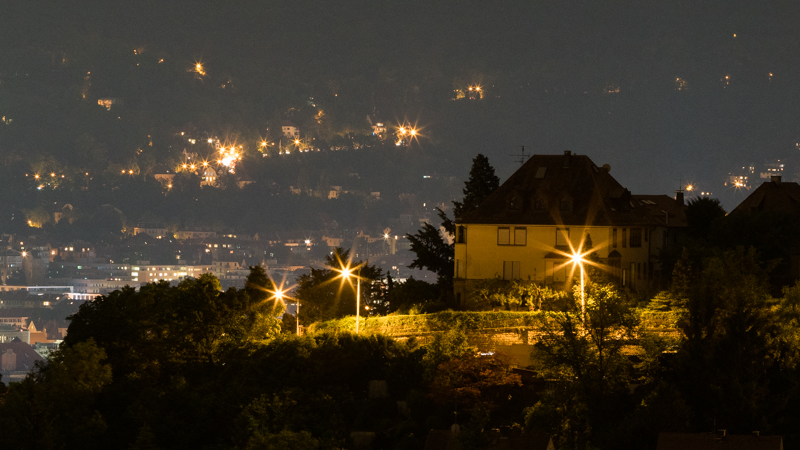
As the lens has an 8-bladed aperture diaphragm I was expecting very good sunstars but honestly I am not overly convinced here. With the newer Voigtlander or the Zeiss Loxia lenses the rays get narrower farther away from the center of the star. This is unfortunately not the case here and the rays tend to fray a little. These are definetly not bad, just not as good as I was expecting.
Chromatic aberrations
longitudinal
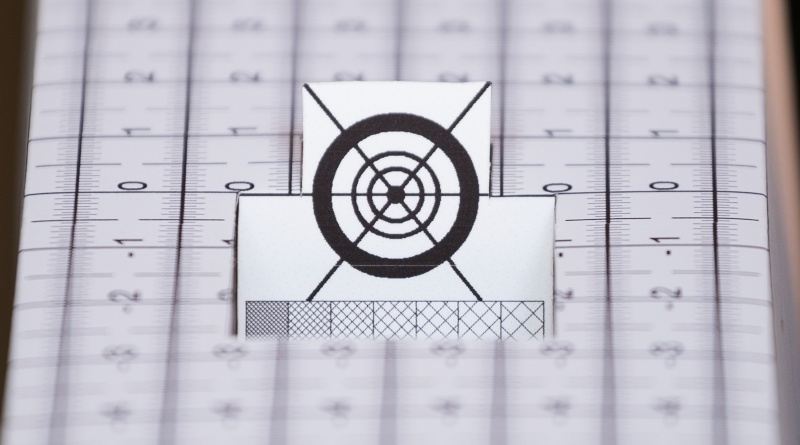
I did not encounter loCA in a mentionable amount. Very good performance.
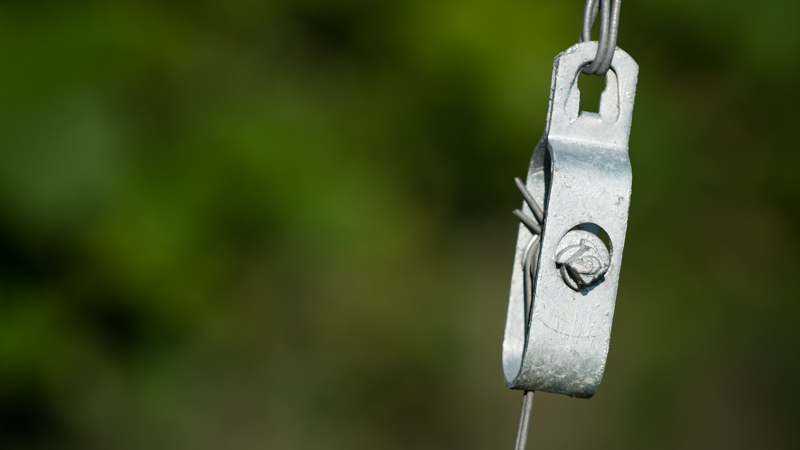
lateral
Sony A7rII | Canon EF 70-200mm 4.0 L | 70mm f/8.0 | CA 100% crop before/after extreme corner
The lateral CA correction is best from 135 to 200mm and worst at 70mm but still easily corrected in post as can be seen above.
Alternatives
Sony FE 70-200mm 4.0 G OSS:
This is the native E-mount option. I haven’t used this one myself, I can only tell you it is heavier, comes with a tripod collar, has 9 rounded aperture blades and built-in OSS. It is also way more expensive, even when taking the needed Canon -> EF adapter into account.
70/80-200mm 2.8:
There are also many legacy 70-200mm 2.8 and 80-200mm 2.8 lenses available. As they are much heavier I did not put that much effort into further research here.
Conclusion
good
|
average
|
not good
|
When taking a look at the table above you can see quite a lot pros and only a few cons. I think this lens is very well balanced regarding optical properties, size/weight and also price. The build quality is also very good, as one would expect from an “L”-lens. The real flaw is the performance against bright light, as the sun inside or near the frame will result in lots of ghosts all over the frame.
But if you can live with this and the size of the lens you can get quite a nice match for the A7 cameras which is also very decently priced (used and also new).
The problem may be the adapter situation here. All three adapters I tested had no problem controlling the aperture, but the AF only seems to be really usable on the more expensive adapters (on the A7rII). So in case this is the only Canon lens you intend to use you really have to question yourself if it is worth buying a 300$ adapter to use only one 350$ lens.
So, who is this lens for? Anyone, who looks for a very good, moderately fast tele zoom with great build quality which does not cost a fortune. You should try the adapter you want to use with the lens before buying either, but don’t have too high hopes for the cheaper adapters, I had these hopes and only got disappointed.
You can get used ones for 450-500$ on ebay.com and for 400-450€ on ebay.de
or you can still buy it new for $599/599€ on amazon.com/amazon.de/B&H (affiliate links)
Sample Images
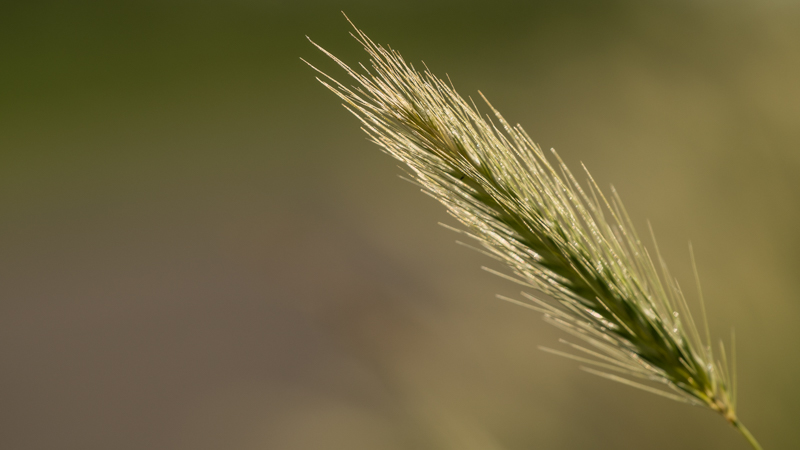
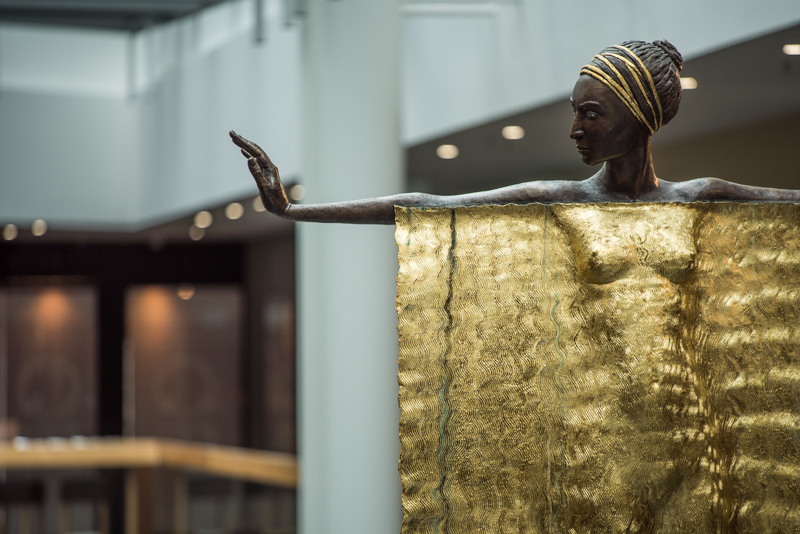
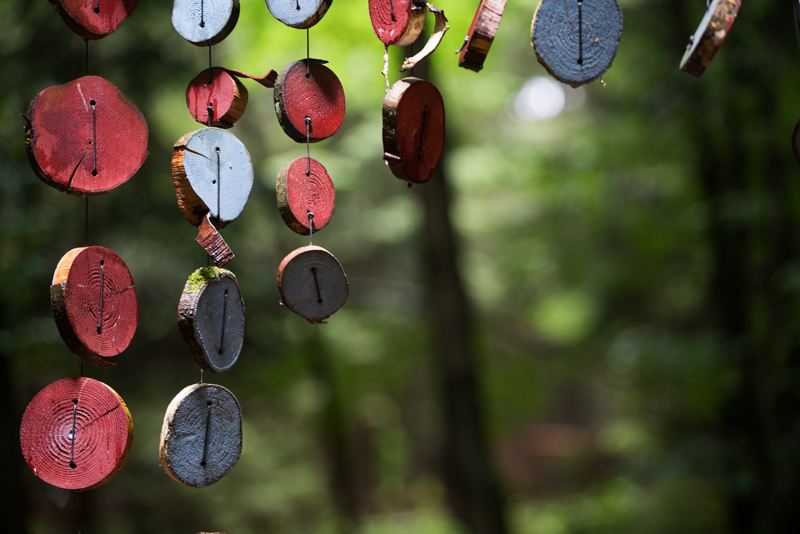
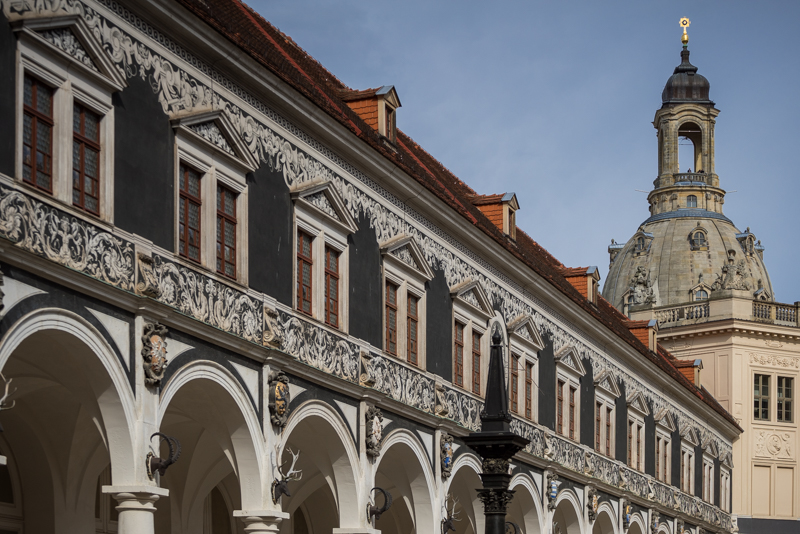
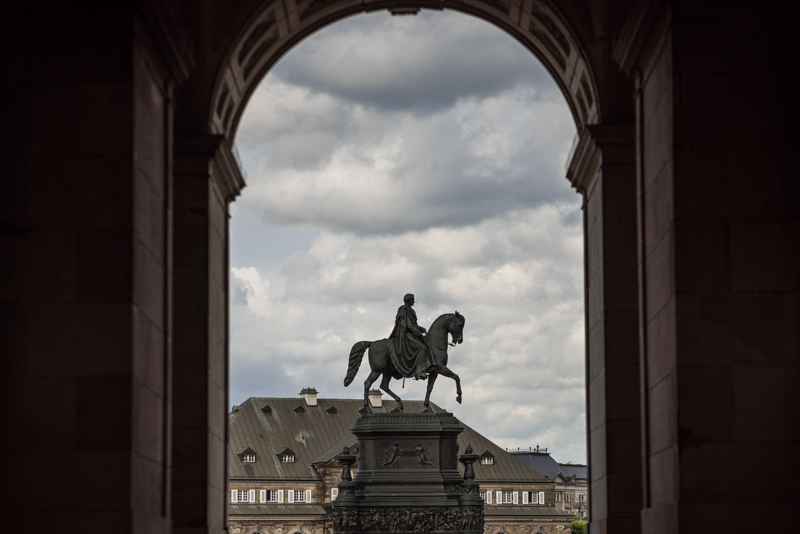
Further Reading
- Leica Summicron 90mm 2.0 pre Asph Review
- Canon FD 300mm 4.0L
- Manual lenses on the A7 cameras – A beginner’s guide
Support Us
Did you find this article useful or just liked reading it? Treat us to a coffee!
![]()
![]()
![]() via Paypal
via Paypal
This site contains affiliate links. If you make a purchase using any of the links marked as affiliate links, I may receive a small commission at no additional cost to you. This helps support the creation of future content.
Latest posts by BastianK (see all)
- Review: Thypoch 21mm 1.4 Simera - July 12, 2025
- Review: SLRmagic 50mm 0.95 Hyperprime LM - July 5, 2025
- Full Resolution Pictures getting fixed - July 4, 2025


If AF is not a priority, I wonder how the Canon FD 80-200/4L would compare to this lens? I thought Phillip reviewed it (or owned one), but didn’t see it listed in the Canon FD reviews, so maybe I’m wrong.
Hi Ron,
my copy of the FD 4/80-200 wasn’t well centered and neither was Jannik’s. I really liked it but since it is a bit rare prices for it went up quite a lot with since the a7 was released and I find it hard to justify spending nearly as much on this old lens when it’s successor can be had for only a little more. I think performance wise it is very close to the EF 4/70-200.
To be honest here, I have tried two samples of the EF 70-200mm 4.0L already and they were both not perfectly centered as well (tested each with 3 adapters, so can rule that one out). So still looking for one…
Meanwhile I am using the 135mm 2.0L, got a very good copy here (at first attempt) for a change 🙂
Thanks for the info Phillip. That’s also interesting, Bastian. I’ve been shooting the Canon 70-200/4 IS version since it was first released. Supposedly it’s slightly better performance than the non-IS version, but I’ve never compared. That said, I don’t think it’s super great for some highly technical applications, but good enough for what I’m doing. However, it’s also considerably more expensive than the non-IS version and I guess getting close to the 70-200/4 FE, let alone the need for the adapter. FWIW, I recently shot an a7RII and the Sony 70-200/4 and thought the results were good (I also tried the new 70-300 but that copy was decentered – soft left side). Last year I picked up a Leica 180/3.4 R… also not a cheap lens, but its performance is quite impressive. It would probably be fun to use on an IBIS body, unfortunately I don’t have one and have to watch shutter speeds or else risk camera shake induced image degradation.
I don’t own the EF L but I currently own the Contax 80-200/4 and the FD 80-200/4L and plan on comparing the two while I have them. My Contax is in better condition (The FD L has fair sized coating scuff on the front element) but for most shots I figure it should still be a fair comparison. I have only noticed an issue when pointing the L lens in the direction of sun.
Both of these lenses occasionally pop up for good prices. I paid $100 for the Contax + shipping and $98 + shipping for the Canon when ebay was running a 15% off coupon.
Not entirely sure how it would compare with the more modern lenses, but have you considered looking at the Minolta 70-210mm F4 (Beercan)? Combined with the Sony LA-EA4 it should give excellent auto-focus performance and is a classic lens.
Weights 695g.
that lens is not in the same league, especially the CA correction is much worse
Was also a little disappointed about the Canon 70-200-f4 on A7r2. Made me move to the Sony 70-200 but also with this lens I have some mixed results regarding corner sharpness. Disappointing 200mm results in the corner.
Made me buying an old guy, a Minolta 200mm f4.0 MC for a very good price. Had luck, the copy was OK.
Think I will use more this lens for my landscapes, reserve the Sony 70-200 more when there is some action to take care off…
CA are easy to correct and the sharpness is like mentioned here : http://artaphot.ch/minolta-sr/objektiv-vergleiche/333-sony-a7r-ze-1-8-55mm-mc-1-4-50mm-mc-2-8-21mm-mc-4-200mm
Thanks for this excellent review
I shipped Bastian a MC 4/200 last week and but I think he wasn’t that impressed by it’s performance as Stephan from artaphot.
I still have to put it through real testing (haven’t check for sharpness at infinity yet, as artaphot did, only at medium distances), but I am one of the maybe 5 persons on earth who doesn’t think sharpness is everything and there are two real downsides for me: minimum focus distance of about 2.4 m and six-bladed aperture diaphragm : /
Bastian
You are welcome!
I am currently preparing a 180/200mm head to head comparison.
So far I have the MC 200mm 4.0 you mentioned lying here and in addition the Leica-R 180mm 4.0, the Nikon AI-S 180mm 2.8 ED and the Nikon AF-S 200mm 2.0 VRI.
I still hope to find a very good copy of the EF 70-200mm 4.0L and maybe someone will offer to lend me some other lenses, would love to see the 180mm 2.0 Zuiko or the 180mm 2.0 APO lens from Leica in this comparison.
Bastian
Thanks! Great review. Did stabilization work correctly via the Sigma adapter?
Thank you!
Stabilization worked without flaws with the Sigma adapter.
Exifs (in comparison to the Commlite adapter) work very well, too.
I have the Minolta MC Tele ROKKOR 200mm f4 and a variant of the Minolta MC Tele ROKKOR-X 135mm f/2.8 – diamond shaped star and 7 wafel zoom ring (There are 16 different variants!). I think they are outstanding. You should give them a test run – and they are not expensive 😉
A side note – overall I think the lenses you test is too expensive. There are a million old vintage lenses out there – try to test some of the more affordable 😉
Otherwise great site…
Hi Bastian,
thanks for this review! What would we E mount shooters do without your supporting work!
Some remarks:
– I have tested and own also quite a few AF adaptors for Sony E mount, and in my experience the ones with the best overall compatibility (with A7II and A7RII) are definitely the metabones (Mk IV). They work reasonably well with all EF mount lenses I could try (so far: Canon 4/24-70 IS, Canon 4/70-200 IS L, Canon 4/300 IS L, Canon 5,6/400 L, Canon 100-400 IS L Mk. II, Sigma Art 1,4/50, Sigma 2,8/150 Macro OS, Sigma Sports 150-600). The praised Sigma MC-11 is definitely inferior with the 150-600 (latest firmware) – for which lens I had purchased it… The same seems true for the “older” Sigma lenses – Metabones working quite well, about the same level as a Sony A mount lens with LA-EA3. And of course, large apertures and a bit of light help…
– I have thrown away my Commlite adaptor in anger and also because I did not want to sell crap to somebody on ebay. I have regretted that, though, as I could have used it for manual lenses like Zeiss ZE… but I was really annoyed about the erratic function of that piece which even caused my bodies to need a reset several times.
– I agree with some comments that the Canon IS 4/70-400 lens is better optically compared to the non IS version – basically with very similar weight and dimensions.
Thanks Uwe for sharing your experiences!
After the warning lensrentals put out about the metabones adapter I couldn’t justify the high price tag.
And as I know Sigma knows a thing or two about reverse engineering and they keep pushing out updates even for their older stuff I indeed do hope for further improvements here.
I do have the Metabones IV and a Canon 70-200mm f4 L IS. They work very well on the a7R II using phase detection indoors and out. Sharpness is superb.
Super Lens
Why the Commlite on the A7rII doesn’t work as good as an the A7II?
I can’t see any reason for this!
Me neither.
I tried this one on the A7 Mark 2 and made a comparison against the Sony FE 70-200/4. The Sony is so much better. Even on the 24 MP Sensor. In my opinon the Canon 70-200/4 is hardly usable if you want something sharp outside the center wide open. Maybe the IS version is better.
Nice review! Would you recommend this lense with manual focus on an A7 Mk I?
I dont want to spend that much money on adapters and I am good with manuel focussing.
I have been manual focusing most of the time with this lens, so no reservations here.
But you will need a ~60$ adapter which allows to adjust the aperture.
Hi guys, just to let you know if it helps, I tried this lens on the Techart III adapter and Af functions mostly worked most of the time but I don’t remember if it was in Nor or Fn mode..
I moved to Sony 70-200 f4 (mostly because sometimes depending on the used mode it would function erratically and it got on my nerves) since then, but I wasn’t disappointed with the image quality, considering the price of the lens used.
I also have the 80-200 FD f4, and the 70-210 f4 FD, and both lenses are ok, but I thought colours were better on the EF version straight out of camera. I do have a couple of examples on my flickr account of the EF version, and maybe even of the FD one.
Thanks anyway for this website that is really, REALLY helpful !
my 2cts
Hey Bastian,
Nice review!
I have an A7II and if the 70-200/4 is the only Canon lens i want to use on my camera would you still recommend the MC-11 or should I go for the cheaper Commlite?
I would never recommend the Commlite adapter.
Exifs are bogus, it can not be updated, build is cheaper, AF is often lacking, no felt to dampen reflections.
But the Commlite can be obtained new on U.S. eBay for around $50 net (with guarantees of a sort); and it continues to have a strong resale value if obtained for a price near what I’ve cited. A Sigma MC-11 will end up being a far costlier initial experiment for those folks for whom the Canon experience on Sony does not work out. You don’t have to marry the thing; a short fling, with a sensible strategy and purpose in mind, may be a more prudent course of action for some… particularly for those readers only interested for the present in adapting Canon EF/EF-S to APS-C Sony bodies.
Hallo. Ich benutze den Fotga Adapter, habe allerdings ein Problem mit den SteadyShot Einstellungen. Ich bekomme bei der Auto Objektiv Einstellung immer einen Anzeigefehler, stelle ich auf Manuell, gibt es nur Festbrennweitenbereiche. Welche SteadyShot Einstellung ist die beste Kombination?
Hallo Sebastian,
die ganzen billigen Adapter geben die Brennweite nicht korrekt an die Kamera weiter, daher funktioniert der Bildstabilisator hier nicht vernünftig und das ist auch einer der Gründe, warum ich vom Kauf dieser Adapter abrate. Das einzige was ich dir (neben dem Kauf eines besseren Adapters) raten kann ist entweder die Brennweite vorzugeben, die du am häufigsten verwendest oder alternativ eine mittlere (135mm).
Dear sir,
I have my A7ii and if I use Viltrox adapter version IV with this lens. What is your opinion? Normally I just want this length for travel. I shoot landscape and normal things.
FE 70-200 f4 G is way more expensive for my budget.
We have no experience with the Viltrox and it is really hard to keep track of all the adapters. So we don’t have an opinion on it.
Thank you for your comment, now I already got the lens but still find the right adapter to use.
I know the Commlight but my new MC11 with the newest firmware works great one the A/RII and you can use eye AF too .
Under low light it lags at 200mm but the rest is fine. But the best i have use is the GM 70-200
The only Prob with the MC-11 is:you can’t youse EF-S lenses.
With the Metabones and the Commelite etc.you can.
This might be not a point of interesset for the fullframe user,but if you have a NEX along with your A7xx you can use some good and cheap EF-S lenses too (without cutting their back off).
I think i’ll go with the heavier EF 70-200 l F/2.8 – will be a good partner to my FD 80-200 L.
Thank you for your very interresting (as allways is…) Test.
Ni!
Can you say how good is the AF on sony A7 “classic”?
I want to use it with a viltrox, commlite ir fotodiox adapter.
Thanks
AF will be very bad, towards 200mm unusable.
Thank you very much, if i use it with a sigma mc11 it will focus faster?
Not sure how fast it will be on the A7, but at least it will work at 200mm.
A bit late but I, too couldn’t find a lot of infos about EF-adapters on the classic A7. Had the Viltrox II and IV with Canon EF 70-210 3.5-4.5 USM: The II focuses very slow and unreliable, the IV much faster but equally unreliable… Both have strong battery drain if left on the camera when turned off.
So I bit the bullet and bought a used metabones IV (I use it in advanced mode) which does a very good job in good light, but is much slower and prone to misfocusing in dim light. But In some situations even eye-af is usable!
IMHO the Metabones is an expensive but viable option on the old A7.
Of course, I don’t know if my experiences are aplicable to the 70-200 f4L.
I am looking for a long landscape lens for my a7Rii. The corner performance on this and the FE70-200 f4 seem a bit lacking. Would the contax 100-300 be another option if I can find a good example where the rear elements are still together.
I somewhat gave up on a long landscape (zoom) lens for the 42mp sensor for now…
Hi Phillip,
I get your point on “why pay the same price for the 80-200F4L when u can have the successor for almost the same price”.
But apart from IQ and AF, can you please explain/give your opinion on the key differences for landscape photography between the FD and EF Version? Also, every lense one might get is probably decentered, so…
– Are size and weight comparable?
– the color white is probably more intimidating (for wildlife)?
– which one (feels) is lighter, wich one smaller?
– which one handles better on the A7 (is more ballanced?)
– which one is the better macro lense?
– which one has better bokeh?
Keep up the good work!
i put together some data (i hope its right):
EF 70-200 f4l USM: 705g; 172 x 76 mm; MFD=1.2m
FD 80-200f4L: 675g 153 x 73 mm; MFD=0.95m
So the FD version should be handier and the better macro lense.
I cant say much about the feel, can you?
I never compared them and since both are high variance lenses a compariosn would not be very helpful. I wasn’t a big fan of the FD’s push-pull focus ring. Its macro feature is certainly handy.
yeah, im not sure about that too…
info on FD80-200
https://phillipreeve.net/blog/85mm-comparison-minolta-tokina-canon-samyang/
Hello,
Thank you for your time and this amazing blog! I wonder if you ever had a chance to try out the magic drainpipe from Canon, EF 80-200mm f2.8? I have this and I like it on the sony a7ii with sigma mc-11 adapter but would be curious as to what I would sacrifice, besides speed (f stop) for swapping out my magic drainpipe for the canon 70-200 f4 usm lens. Thank you again for this blog and happy shooting from Lofoten, Norway. Ps , if you are ever in the area, I can take you to some good spots, would be my pleasure! 🙂
I have no personal experience with the EF 80-200mm 2.8, sorry!
But when (not if) I come to Lofoten I will gladly take that offer 🙂
So which of the IS or NON IS is the best to pick ????
IS is a little better but more expensive.
Hello all together.
Can anybody here confirm that eye af works with canon 70-200 f4 and mc11 on a Sony a7rii?
Thanks for any reply in advance.
It doesn’t, you need a gen 3 camera for that.
But normal face detect will work and is usually good enough with an f/4 lens.
Excellent review, thank you. It’s incredible how well this lens focuses on a 3rd gen camera with the MC-11 for stills.
Did you encounter any amount of variance with this lens? I have a copy as well and the corners can range from soft to really sharp depending on the focal length. 70mm is the worst on my copy, with one corner being really soft and the others being just OK at f/4.
Unfortunately yes.
There is quite some variance.
That’s a shame. The lens is very impressive otherwise… it’s really sharp in the mid-frame and center areas, and at least the corners improve on stopping down. I was debating on attempting to find a better copy but now I don’t think I will, seems it would be a gamble and I might end up with something worse.
I also tried 2 until I found one that I am okay happy with.
It’s a zoom…
Hi,
Is there a difference in terms of optical and AF performance of the 70 200 L F4 vs 70 200 L 2.8 non is versions?
As they are completely different lenses: most likely yes.
Would you say the 2.8 is the better lens considering sharpness , flare, distortion, aberations etc?
I found these lenses to buy at a reasonable price, and i can’t decide which to buy.. help please.
I haven’t used the old 70-200mm 2.8 personally.
You should ask yourself the questions: do you need f/2.8? Are you willing to carry the heavier f/2.8 lens?
These questions are way more important than the differences in image quality.
I did ask myself these questions :). I am still thinking which one would fit my needs better. I was just curious in terms of AF and optical results.
Thank you for your replies!
Ps: i saw your cast on Friday evening (laowa’s channel), really nice job with splendid pictures.
Thank you 🙂
Both are capable lenses with very good price/performance ratio and should do the job.
Hi Bastian,
In the end I got the f4 non IS version. Found one at 250 euro + another 100 euro, Sigma MC-11 adator (just arrived today). Took some pictures, at 1st glimpse looks really nice. Will play a bit more next days to follow :). I’m sure I will enjoy this lens a lot.
In your experience while putting together this review, have you ever encountered any strange noise made by the lens when turning of the camera? I Noticed while turning off the camera a strange noise made (probably) by the aperture blades, closing in from f4.
Should I be worry about this?
Thank you and looking forward for your reply
Probably the aperture blades, not a problem.
I tried all my EF lenses on a used Metabones V. But I have only an A7R.
My experience were generally better than expected except for the wide angle lens.
– My 17-40L is by far worse than on a genuine Canon body. It is a little bit decentered (unsharpness on the left). No surprise the Sony sensor does less forgiving that as my 16,7MP Canon FF body. For 70% of the image the lens is usable. But there are a lot more artifacts with the Sony as with the Canon. I recommend to take the APS-C-Mode. In this mode you can use it at every focal length and edge sharpness is good. Distortion is less visible. But you loose the fantastic 17-20mm FF focal length. Maybe it is the Metabones as well. It has not a good reputation for WW lenses regarding sharpness, distortion and other artifacts. But for everything above I am very satisfied with the Metabones.
– The EF 2/135L and the EF 4/300L rock adpated with the Metabones V if AF-Speed is not that important. They are stellar lenses for Canon Bodies as well of course. But the Sony Sensor gets even more out of them. Even Exifs, exposures and colours are better than expected. And had no AF accuracy, just with the speed. But the A7R is just contrast detect.
– Have the same experience with the EF 4/70-200L than in this review. Very good around 135 and stopped down. But avoid AF for short distances. There is a workaround. Use 135mm stopped down and extensions rings with Focus Peaking and not AF. I created some good macros with that.
– The Zeiss Makro Planar is my best lens with the Metabones and the A7. Outstanding because of the MF being truly excellent with Sonys superior Focus Peaking over the AF Confirmation of the genuine Canon DSLRs. But things are different if there is wind or fast moving insects. For stills and on a tripod this combo is hard to beat quality wise.